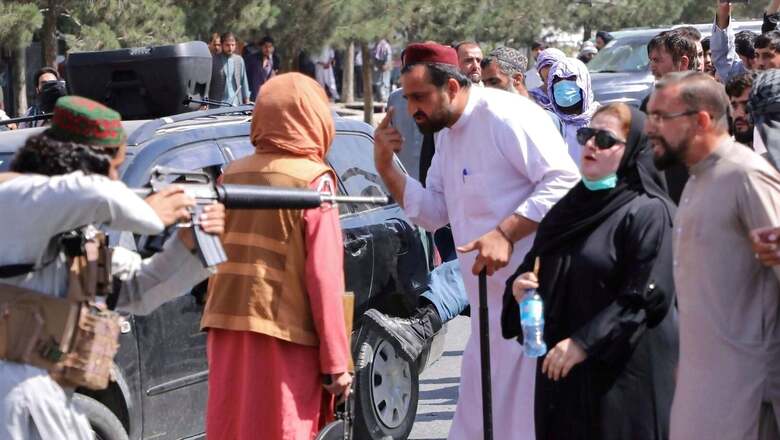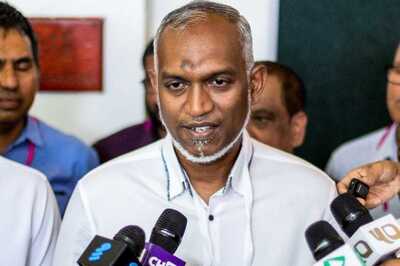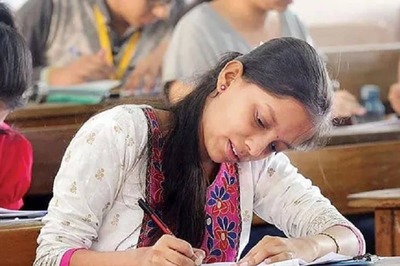
views
After days of speculations and multiple back and forth as they tried to placate several stakeholders, the Taliban on Tuesday announced their new cabinet. Mullah Hasan Akhund, an associate of the movement’s late founder Mullah Omar, is the head of Afghanistan’s new government, with Mullah Abdul Ghani Baradar, head of the movement’s political office, as deputy.
Sirajuddin Haqqani, son of the founder of the Haqqani network, will be the new interior minister, the Taliban’s main spokesman Zabihullah Mujahid told a news conference in Kabul.
The new Taliban cabinet consists of at least five UN-designated terrorists.
MULLAH MUHAMMAD HASSAN AKHUND, ACTING PRIME MINISTER
Akhund is the longtime head of the Taliban’s powerful decision-making body Rehbari Shura, or leadership council. He was first the foreign minister and then deputy prime minister during the Taliban’s last rule from 1996-2001.
Like many in the Taliban leadership, Akhund derives much of his prestige from his proximity to the movement’s reclusive first leader, Mullah Mohammad Omar.
He hails from Kandahar, the birthplace of the Taliban.
A U.N. sanctions report described him as a “close associate and political adviser” to Omar.
Akhund is highly respected within the movement, especially by its supreme leader Haibatullah Akhundzada, a Taliban source said.
Some observers see Akhund, believed to be in his mid-60s and possibly older, as more of a political than a religious figure, with his control over the leadership council also giving him a say in military affairs.
ABDUL GHANI BARADAR, ACTING DEPUTY PRIME MINISTER
Baradar was once a close friend of Mullah Omar, who gave him his nom de guerre, “Baradar” or “brother”.
He served as deputy defence minister when the Taliban last ruled Afghanistan.
Following the fall of the Taliban government, Baradar served as a senior military commander responsible for attacks on coalition forces, a UN sanctions notice said.
He was arrested and imprisoned in Pakistan in 2010. After his release in 2018, he headed the Taliban’s political office in Doha, becoming one of the most prominent figures in peace talks with the United States.
MAULAVI ABDUL SALAM HANAFI, ACTING DEPUTY PRIME MINISTER
Believed to be 53 years old, Hanafi was made in charge of the Jawzujan province in northern Afghanistan in May 2007. He remains under the United Nations sanctions for drug trafficking. Hanafi is said to have been key to the US-Afghanistan peace deal that saw the American troops being pulled out of the war-torn nation ending almost 0 years of war and destruction.
He has also been central to the Taliban’s negotiations with Russia, China and others since 2015 — when he was appointed deputy political head of the Islamic Emirate of Afghanistan — and often jetted to Moscow, Beijing and Doha for key talks, a piece in ozy.com reported.
As of May 2007, the Taliban leadership placed Abdul Salam Hanafi Ali Mardan Qul in charge of The Jawzujan Province. He was also the Taliban member responsible for Jawzjan Province in Northern Afghanistan until 2008. He is believed to be involved in drug trafficking.
AMIR KHAN MUTTAQI, ACTING FOREIGN MINISTER
Originally from Paktia, Muttaqi calls himself a resident of Helmand.
Muttaqi served as minister of culture and information during the previous Taliban government, as well as minister of education. Muttaqi was later sent to Qatar and was appointed a member of the peace commission and negotiation team that held talks with the United States.
Neither militant commander nor religious leader, according to Taliban sources, Muttaqi is the chair of the Invitation and Guidance Commission, which during the insurgency had led efforts to get government officials and other key figures to defect.
In statements and speeches, while fighting raged for control of the country, he projected a moderate voice, calling on forces holed up in provincial capitals to talk to the group to avoid fighting in urban areas.
In the weeks after the fall of Kabul, Muttaqi played a similar role with the lone holdout province of Panjshir, calling for a peaceful settlement to hostilities.
SIRAJUDDIN HAQQANI, ACTING INTERIOR MINISTER
Head of the influential Haqqani network, Sirajuddin Haqqani succeeded as its leader following the death of his father, Jalaluddin Haqqani, in 2018.
Initially backed by the United States as one of the most effective anti-Soviet militia in the 1980s, the semi-autonomous group was blamed for some of the deadliest attacks on coalition forces.
The network, whose exact status within the Taliban structure is debated, has been named a Foreign Terrorist Organization by the United States although the Taliban itself has not.
The United Nations Sanctions Committee also has also said the group, based in the lawless frontier areas between Afghanistan and Pakistan, has close involvement in drugs production and trade.
Haqqani is one of the FBI’s most wanted men, due to his involvement in suicide attacks and ties with Al Qaeda. The U.S. State Department has offered a reward of up to $10 million for information leading to his arrest.
(With Reuters inputs)
Read all the Latest News, Breaking News and Assembly Elections Live Updates here.




















Comments
0 comment